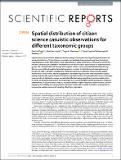Spatial distribution of citizen science casuistic observations for different taxonomic groups
Date
16/10/2017Metadata
Show full item recordAbstract
Opportunistic citizen science databases are becoming an important way of gathering information on species distributions. These data are temporally and spatially dispersed and could have limitations regarding biases in the distribution of the observations in space and/or time. In this work, we test the influence of landscape variables in the distribution of citizen science observations for eight taxonomic groups. We use data collected through a Portuguese citizen science database (biodiversity4all.org). We use a zero-inflated negative binomial regression to model the distribution of observations as a function of a set of variables representing the landscape features plausibly influencing the spatial distribution of the records. Results suggest that the density of paths is the most important variable, having a statistically significant positive relationship with number of observations for seven of the eight taxa considered. Wetland coverage was also identified as having a significant, positive relationship, for birds, amphibians and reptiles, and mammals. Our results highlight that the distribution of species observations, in citizen science projects, is spatially biased. Higher frequency of observations is driven largely by accessibility and by the presence of water bodies. We conclude that efforts are required to increase the spatial evenness of sampling effort from volunteers.
Citation
Tiago , P , Ceia-Hasse , A , Marques , T A , Capinha , C & Pereira , H M 2017 , ' Spatial distribution of citizen science casuistic observations for different taxonomic groups ' , Scientific Reports , vol. 7 , 12832 . https://doi.org/10.1038/s41598-017-13130-8
Publication
Scientific Reports
Status
Peer reviewed
ISSN
2045-2322Type
Journal article
Description
PT acknowledges support from the Portuguese Foundation for Science and Technology (FCT/MCTES) (SFRH/BD/89543/2012). ACH acknowledges support from the Portuguese Foundation for Science and Technology (FCT/MCTES) (UID/BIA/50027/2013) and from FEDER through the Operational Programme for Competitiveness Factors – COMPETE (POCI-01-0145-FEDER-006821). TAM thanks partial support by CEAUL (funded by FCT - Fundação para a Ciência e a Tecnologia, Portugal, through the project UID/MAT/00006/2013). CC acknowledges support from the Portuguese Foundation for Science and Technology (FCT) FCT for funds to GHTM - UID/Multi/04413/2013. We thank all volunteers who participate in BioDiversity4All project.Collections
Items in the St Andrews Research Repository are protected by copyright, with all rights reserved, unless otherwise indicated.

